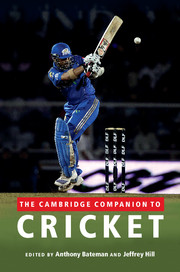Book contents
- Frontmatter
- Introduction
- 1 Cricket pastoral and Englishness
- 2 Cricket in the eighteenth century
- 3 Corruption in cricket
- 4 Broadcasting and cricket in England
- 5 Bodyline, Jardine and masculinity
- 6 Don Bradman: just a boy from Bowral
- 7 The Packer cricket war
- 8 New Zealand cricket and the colonial relationship
- 9 C. L. R. James and cricket
- 10 Reading Brian Lara and the traditions of Caribbean cricket poetry
- 11 The detachment of West Indies cricket from the nationalist scaffold
- 12 The Indian Premier League and world cricket
- 13 Hero, celebrity and icon: Sachin Tendulkar and Indian public culture
- 14 Conflicting loyalties: nationalism and religion in India–Pakistan cricket relations
- 15 Cricket and representations of beauty: Newlands Cricket Ground and the roots of apartheid in South African cricket
- 16 Writing the modern game
- 17 Cricket and international politics
- Further reading
- Index
9 - C. L. R. James and cricket
Published online by Cambridge University Press: 28 September 2012
- Frontmatter
- Introduction
- 1 Cricket pastoral and Englishness
- 2 Cricket in the eighteenth century
- 3 Corruption in cricket
- 4 Broadcasting and cricket in England
- 5 Bodyline, Jardine and masculinity
- 6 Don Bradman: just a boy from Bowral
- 7 The Packer cricket war
- 8 New Zealand cricket and the colonial relationship
- 9 C. L. R. James and cricket
- 10 Reading Brian Lara and the traditions of Caribbean cricket poetry
- 11 The detachment of West Indies cricket from the nationalist scaffold
- 12 The Indian Premier League and world cricket
- 13 Hero, celebrity and icon: Sachin Tendulkar and Indian public culture
- 14 Conflicting loyalties: nationalism and religion in India–Pakistan cricket relations
- 15 Cricket and representations of beauty: Newlands Cricket Ground and the roots of apartheid in South African cricket
- 16 Writing the modern game
- 17 Cricket and international politics
- Further reading
- Index
Summary
Cyril Lionel Robert James (1901–1989), known universally as ‘CLR’, or ‘Nello’ to those who were closer to him, was born in Tunapuna, Trinidad (at that time a British colony), though he spent most of his adult life in Britain and the United States. James is probably cricket's greatest writer, but was also a renowned historian, Marxist scholar and interpreter of literary texts (Melville most notably); as well as being (more often than not several of these at the same time) a deeply engaged socialist organiser and militant, newspaper editor, cricket correspondent for the Manchester Guardian, writer of novels and children's stories, and a polemicist and essayist who used his pen indefatigably on behalf of a wide range of causes (West Indian independence from Britain, the Pan-African movement, the plight of black sharecroppers in the American South, decolonisation and struggles against racism, the social and economic predicament of workers in the Lancashire cotton mills of the 1930s, to mention but a few).
Cricket, along with mountaineering, has been notable amongst sports for the quality of its associated literary productivity, and well-known authors who have written on the former include, to mention but a few, William Hazlitt, Siegfried Sassoon, Dorothy Sayers, P. G. Wodehouse and Hugh de Selincourt. These fictional depictions deal overwhelmingly with a form of the game known in England as ‘village cricket’, very far removed in terms of expertise and competitive rigour from the international, and the county (England), state (Australia) or island (the West Indies) forms of the game described and analysed by James.
- Type
- Chapter
- Information
- The Cambridge Companion to Cricket , pp. 131 - 143Publisher: Cambridge University PressPrint publication year: 2011



